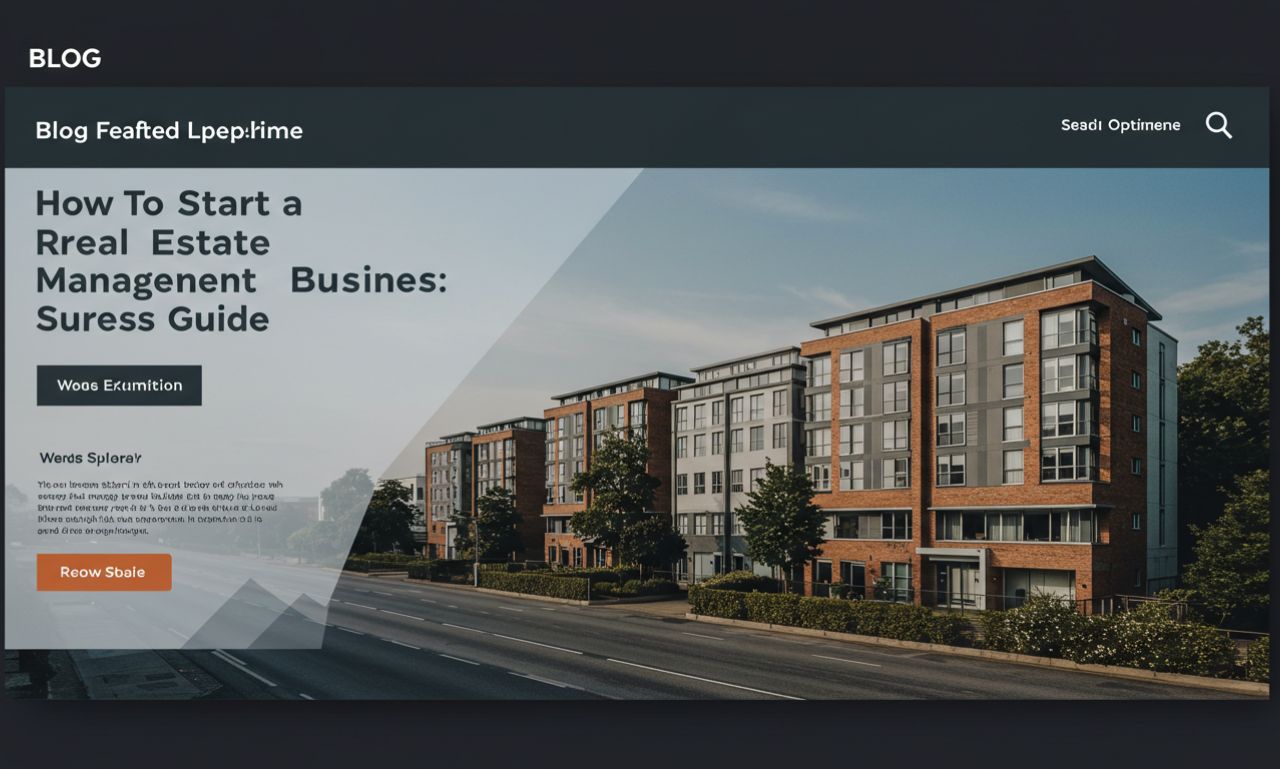Starting a real estate management business can be a lucrative venture for those passionate about property, people, and profits. With the U.S. real estate market valued at over $3.9 trillion in 2024 (Statista), the demand for professional property management services is soaring. Whether you’re eyeing residential rentals, commercial properties, or vacation homes, launching a real estate management company offers a pathway to financial independence and industry influence. This comprehensive guide will walk you through the actionable steps, insider tips, and expert strategies to successfully start a real estate management business, even if you’re starting from scratch.
From crafting a business plan to navigating legal requirements and leveraging technology, this article covers everything you need to build a thriving property management empire. Let’s dive into the blueprint for success.
Why Start a Real Estate Management Business?
The property management industry is a cornerstone of the real estate sector, bridging property owners and tenants while ensuring seamless operations. Here’s why this business is worth considering:
- High Demand: With 44.1 million rental units in the U.S. (U.S. Census Bureau, 2023), property owners increasingly rely on professionals to manage their investments.
- Recurring Revenue: Monthly management fees (typically 8–12% of rent) provide stable, predictable income.
- Scalability: From single-family homes to large apartment complexes, you can scale your portfolio as your expertise grows.
- Flexibility: Operate locally or expand into multiple markets with the right systems.
However, success requires strategic planning, industry knowledge, and a commitment to exceptional service. Let’s explore the steps to launch your real estate management business.
Step 1: Research the Real Estate Management Industry
Before diving in, understand the industry’s landscape, trends, and challenges. Property management involves overseeing residential, commercial, or industrial properties, including tenant relations, maintenance, rent collection, and compliance with local laws.
Key Industry Insights
- Market Growth: The global property management market is projected to reach $36.4 billion by 2028, growing at a CAGR of 8.7% (Grand View Research, 2023).
- Technology Adoption: Tools like Buildium, AppFolio, and Yardi streamline operations, with 68% of property managers using software to manage portfolios (NAR, 2024).
- Regulatory Complexity: Each state has unique landlord-tenant laws, requiring compliance expertise.
Actionable Steps
- Analyze Local Markets: Research rental demand, property types, and competition in your target area (e.g., Zillow, Realtor.com).
- Identify Niches: Consider specializing in residential, commercial, vacation rentals, or affordable housing.
- Join Industry Groups: Engage with the National Association of Residential Property Managers (NARPM) or the Institute of Real Estate Management (IREM) for networking and certifications.
Step 2: Create a Comprehensive Business Plan
A solid business plan is the foundation of your real estate management business. It outlines your goals, strategies, and financial projections.
Key Components of Your Business Plan
| Section | Details |
|---|---|
| Executive Summary | Summarize your vision, target market, and unique value proposition. |
| Market Analysis | Detail local demand, competition, and growth opportunities. |
| Services Offered | List services (e.g., tenant screening, maintenance, lease management). |
| Marketing Strategy | Outline digital and traditional marketing plans (SEO, PPC, local ads). |
| Financial Projections | Estimate startup costs, revenue streams, and break-even points. |
| Operational Plan | Define staffing, technology, and workflows. |
Tips for Success
- Set Clear Goals: Aim for specific milestones, like managing 50 properties in year one.
- Budget Wisely: Startup costs range from $2,000–$10,000, covering licensing, software, and marketing (Forbes, 2024).
- Leverage Tools: Use business plan templates from SCORE or the Small Business Administration (SBA).
Step 3: Obtain Necessary Licenses and Certifications
Compliance is critical in property management. Requirements vary by state, but most regions mandate specific licenses and certifications.
Licensing Requirements
- Real Estate License: Many states require a real estate broker’s or property management license (e.g., California, Texas).
- Business License: Register your business with local authorities.
- Certifications: Pursue credentials like NARPM’s Residential Management Professional (RMP) or IREM’s Certified Property Manager (CPM).
Steps to Get Licensed
- Check State Regulations: Visit your state’s real estate commission website (e.g., California DRE, Florida DBPR).
- Complete Pre-Licensing Education: Enroll in courses through providers like Kaplan or The CE Shop.
- Pass Licensing Exams: Schedule and pass state-specific exams.
- Maintain Compliance: Renew licenses and complete continuing education as required.
Pro Tip
Consider forming an LLC to protect personal assets and enhance credibility. Consult an attorney or use services like LegalZoom for guidance.
Step 4: Build Your Brand and Online Presence
A strong brand and digital presence are essential for attracting clients in a competitive market.
Branding Essentials
- Business Name: Choose a memorable, professional name (e.g., “Prime Property Solutions”).
- Logo and Website: Invest in a professional logo and a user-friendly website optimized for SEO.
- Social Media: Establish profiles on LinkedIn, Facebook, and Instagram to showcase expertise.
SEO and Digital Marketing Strategies
- Keyword Optimization: Target long-tail keywords like “how to start a real estate management business in [city]” or “best property management services.”
- Content Marketing: Publish blog posts on topics like “Top 10 Tenant Screening Tips” or “How to Maximize Rental Income.”
- Local SEO: Claim your Google Business Profile and optimize for local searches (e.g., “property management near me”).
- Paid Ads: Use Google Ads or Facebook Ads to target property owners in your area.
Tools to Use
| Tool | Purpose | Cost |
|---|---|---|
| Buildium | Property management software | $50–$200/month |
| Canva | Design logos and marketing assets | Free–$15/month |
| WordPress | Build a professional website | $5–$50/month |
| Google Analytics | Track website performance | Free |
Step 5: Develop Operational Systems
Efficient operations are the backbone of a successful real estate management business. Streamline processes to save time and deliver exceptional service.
Key Systems to Implement
- Tenant Screening: Use services like RentPrep or MySmartMove to vet applicants.
- Maintenance Management: Partner with reliable contractors and use apps like HomeAdvisor.
- Accounting: Track income and expenses with QuickBooks or Wave.
- Communication: Use tools like Slack or Trello for team coordination.
Technology Stack
- Property Management Software: AppFolio, Buildium, or Propertyware for managing leases, payments, and maintenance.
- CRM Tools: HubSpot or Zoho CRM to nurture client relationships.
- Document Management: Google Drive or DocuSign for secure lease storage.
Step 6: Market Your Services and Acquire Clients
Attracting property owners is critical to growing your business. Combine traditional and digital marketing to build your client base.
Marketing Strategies
- Networking: Attend local real estate investor meetups or join chambers of commerce.
- Referrals: Offer incentives for clients who refer new property owners.
- Direct Mail: Send postcards to landlords in high-rental areas.
- Online Reviews: Encourage satisfied clients to leave reviews on Google and Yelp.
Client Acquisition Tips
- Target Small Landlords: Focus on owners with 1–10 properties who need professional help.
- Offer Free Consultations: Provide value upfront to build trust.
- Showcase Expertise: Share case studies or testimonials on your website.
Step 7: Scale Your Business
Once your business is established, focus on growth and scalability.
Scaling Strategies
- Hire Staff: Add property managers, leasing agents, or administrative support.
- Expand Services: Offer additional services like real estate sales or HOA management.
- Enter New Markets: Target neighboring cities or states with high rental demand.
- Franchise Opportunities: Explore franchising models like Real Property Management.
Metrics to Track
| Metric | Target |
|---|---|
| Client Retention Rate | 90%+ |
| Portfolio Growth | 10–20 new properties/year |
| Profit Margin | 20–30% |
| Tenant Satisfaction | 4.5+ stars on reviews |
FAQs About Starting a Real Estate Management Business
What qualifications do I need to start a real estate management business?
You typically need a real estate or property management license, depending on state regulations. Certifications like NARPM’s RMP or IREM’s CPM enhance credibility. Business acumen and customer service skills are also essential.
How much does it cost to start a property management company?
Startup costs range from $2,000–$10,000, covering licensing, software, marketing, and insurance. Ongoing expenses include software subscriptions ($50–$200/month) and staffing costs.
How do property managers find clients?
Effective strategies include local SEO, networking with real estate investors, direct mail campaigns, and leveraging online reviews. Offering free consultations can also attract new clients.
What software is best for property management?
Top options include Buildium, AppFolio, and Yardi. These platforms streamline tenant screening, rent collection, and maintenance tracking, with pricing starting at $50/month.
Is property management a profitable business?
Yes, property management can be highly profitable, with management fees typically 8–12% of monthly rent. Scaling your portfolio and optimizing operations can yield 20–30% profit margins.
Conclusion
Starting a real estate management business is a rewarding opportunity for entrepreneurs with a passion for real estate and customer service. By following these steps—researching the market, crafting a business plan, obtaining licenses, building a brand, and leveraging technology—you can establish a thriving company that meets the needs of property owners and tenants alike. The industry’s growth potential, coupled with your dedication to excellence, positions you for long-term success.

